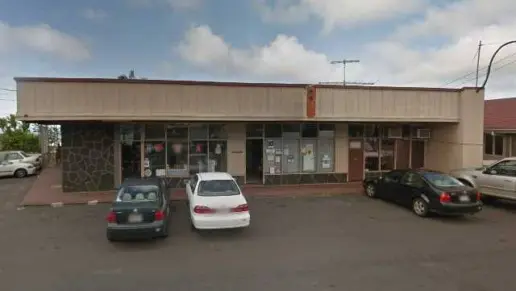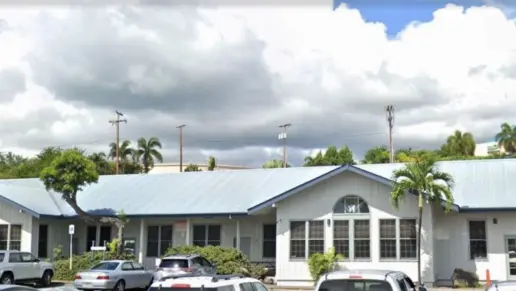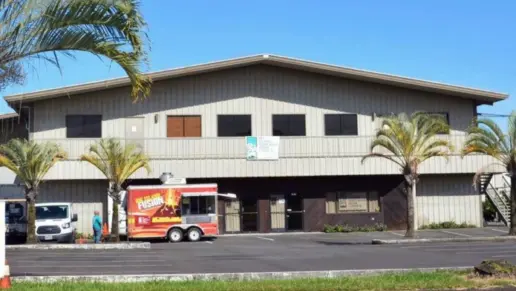About the Facility
Big Island Substance Abuse Council - Hilo High School offers outpatient treatment for individuals with alcohol and/or substance addiction. The program includes individual counseling, group therapy, dual-diagnosis treatment and more. Big Island Substance Abuse Council - Hilo High School is located in Hilo, Hawaii.
Since 1964, Big Island Substance Abuse Council – Waianuenue Avenue has been inspiring individuals and families to reclaim and enrich their lives in the wake of the ravages of substance abuse. They offer a continuum of services that are culturally appropriate and aligned with the ever-changing behavioral health field.
 Accreditations
Accreditations

CARF
The Commission on Accreditation of Rehabilitation Facilities (CARF) is a non-profit organization that specifically accredits rehab organizations. Founded in 1966, CARF's, mission is to help service providers like rehab facilities maintain high standards of care.
CARF Accreditation: Yes
 Treatment
Treatment
 Alcoholism
Alcoholism
Alcohol use disorder (AUD), also called alcoholism, can be mild, moderate, or severe. Symptoms include being unable to limit alcohol consumption and feeling strong cravings to drink alcohol. Individuals with AUD may have tried to quit drinking but were unsuccessful. Typically, professional rehab in Hawaii is necessary to help individuals overcome alcohol addiction. This treatment provides the necessary evidence-based therapies, medication, and support for long-term recovery.
 Drug Addiction
Drug Addiction
Drug rehab in Hawaii is for individuals suffering from substance use disorders. Treatment addresses the many issues involved with addiction, typically through a combination of medical and psychotherapy treatments.
 Dual Diagnosis
Dual Diagnosis
In Hawaii, dual-diagnosis addiction treatment programs recognize the importance of treating substance use disorders and mental health conditions simultaneously. They offer various levels of care, depending on your needs. Treatment settings include detox, outpatient, residential rehab, and partial hospitalization options. Using a combination of evidence-based and holistic therapies, like cognitive behavioral therapy, or dialectical behavioral therapy, adventure therapy, and acupuncture, clinicians address substance use disorders and co-occurring disorders.
 Mental Health and Substance Abuse
Mental Health and Substance Abuse
Hawaii’s dual-diagnosis rehabs typically offer comprehensive mental health and substance abuse treatment to support individuals in overcoming their addiction and gaining the skills to maintain a drug and alcohol-free life. Usually offered on an inpatient or outpatient basis, these treatment programs typically offer evidence-based therapies, like cognitive-behavioral therapy (CBT), skill development workgroups, comprehensive relapse prevention, stress management techniques, and a supportive recovery community. Together, these treatment components drastically increase the chances of long-term recovery.
 Opioid Addiction
Opioid Addiction
Opioid rehabs specialize in supporting those recovering from opioid addiction. They treat those suffering from addiction to illegal opioids like heroin, as well as prescription drugs like oxycodone. These centers typically combine both physical as well as mental and emotional support to help stop addiction. Physical support often includes medical detox and subsequent medical support (including medication), and mental support includes in-depth therapy to address the underlying causes of addiction.
 Insurance and Financial
Insurance and Financial
Financing available
Free
Self-pay options
Private insurance
 Programs
Programs
-
Adolescence program
-
Adult program
-
Program for men
-
Program for women
-
Young adult program
 Levels of Care
Levels of Care
 Outpatient
Outpatient
Clients receiving treatment in an outpatient rehab typically require less intensive support and supervision than do persons in inpatient care. Many have already completed inpatient programs and are weeks or months along in their recovery journey. Outpatient treatment generally involves the continuation of treatments begun in inpatient care, including addiction counseling and life skills development. Some outpatient programs also offer medication assisted treatment (MAT) for clients in opioid and/or alcohol recovery.
 Intensive Outpatient
Intensive Outpatient
Intensive outpatient programs (IOP) enable clients to continue to live at home and, often, to work while also receiving robust therapeutic support. Clients attend multiple treatment sessions per week, where they typically receive a combination of psychotherapy, addiction education and recovery skills training, and evidence-based complementary care. Medication assisted treatment (MAT) is also available in many intensive outpatient rehabs. Treatment typically involves between nine and 20 therapeutic hours weekly. IOP is ideal for clients in early recovery.
 Aftercare Support
Aftercare Support
Completing a drug or alcohol rehab program shouldn't spell the end of substance abuse treatment. Aftercare involves making a sustainable plan for recovery, including ongoing support. This can include sober living arrangements like halfway houses, career counseling, and setting a patient up with community programs like Alcoholics Anonymous (AA) or Narcotics Anonymous (NA).
 Clinical Services
Clinical Services
Family Therapy
Research clearly demonstrates that recovery is far more successful and sustainable when loved ones like family members participate in rehab and substance abuse treatment. Genetic factors may be at play when it comes to drug and alcohol addiction, as well as mental health issues. Family dynamics often play a critical role in addiction triggers, and if properly educated, family members can be a strong source of support when it comes to rehabilitation.
Group Therapy
Group therapy is any therapeutic work that happens in a group (not one-on-one). There are a number of different group therapy modalities, including support groups, experiential therapy, psycho-education, and more. Group therapy involves treatment as well as processing interaction between group members.
Individual Therapy
In individual therapy, a patient meets one-on-one with a trained psychologist or counselor. Therapy is a pivotal part of effective substance abuse treatment, as it often covers root causes of addiction, including challenges faced by the patient in their social, family, and work/school life.
Life Skills
Life skills trainings involve all the skills a person must have in order to function successfully in the world. These include time management, career guidance, money management, and effective communication. Truly successful addiction recovery is based on the ability to not only live substance-free, but to thrive. Life skills teaches the practical necessities of functioning in society, which sets clients up for success in life, and therefore sobriety.
Nicotine Replacement Therapy
Nicotine Replacement Therapy (NRT) is a way of getting nicotine into the bloodstream without smoking. It uses products that supply low doses of nicotine to help people stop smoking. The goal of therapy is to cut down on cravings for nicotine and ease the symptoms of nicotine withdrawal.
Trauma Therapy
Trauma therapy addresses traumatic incidents from a client's past that are likely affecting their present-day experience. Trauma is often one of the primary triggers and potential causes of addiction, and can stem from child sexual abuse, domestic violence, having a parent with a mental illness, losing one or both parents at a young age, teenage or adult sexual assault, or any number of other factors. The purpose of trauma therapy is to allow a patient to process trauma and move through and past it, with the help of trained and compassionate mental health professionals.
 Contact
Contact
297 Waianuenue Avenue
Hilo HI, 96720


